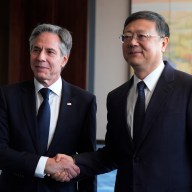KANDAHAR, Afghanistan – Thousands of Afghans defied Taliban threats and attended political campaign rallies in Kandahar on the weekend, vowing to go to the polls this week to elect their president and provincial councils.
The same day that a suicide bomber blew himself up outside the NATO headquarters in Kabul, killing seven civilians, hundreds of men gathered in Kandahar city to hear from presidential candidate Ashraf Ghani, one of the main challengers of President Hamid Karzai.
The next day, Sunday, thousands of men and women gathered in support of Karzai.
The rallies were no small act of defiance in this, the spiritual birthplace of the Taliban.
“There was time where people of Kandahar gathered in this stadium for executions,” Haji-Agha Lalai, a member of the provincial council and director of the Peace and Reconciliation office in Kandahar, told the crowd. “Today we are free and gathered to choose our leader.”
Buses brought people in from regions all over the province, including Spin Boldak on the Pakistan border, Shah-Wali-Kot to the north, Dand and the Zhari and Panjwaii districts, where so many of Canada’s soldiers have lost their lives.
The commander of Canadian Forces in Kandahar is all but certain insurgents will attack on election day.
“I can absolutely assure you that there will be challenges. The Taliban will act, as they do every day,” says Brig.-Gen Jonathan Vance.
“If it doesn’t happen, good; if it does happen, it’s anticipated.”
The Thursday vote is taking place under “less than ideal” conditions, admits Grant Kippen, the Canadian chairman of the Afghan Election Complaints Commission, and undoubtedly one of the busiest men in the country these days.
But as election day nears, the Ottawa native says there are more rallies, such as the ones in Kandahar on the weekend, and more interest from the public.
“I think, over time, people are understanding the process more. Hopefully they will be participating in the way other countries participate.”
His hopes are bolstered by the attendance of about 1,500 women at Sunday’s rally in Kandahar – an extremely conservative province where the Taliban still try to exercise their brutal brand of justice for those who defy them.
Even more shockingly, a handful of women came without the head-to-toe burqa, eschewing the suffocating garment in exchange for head scarves that cover all but their eyes. You can see their eyes.
Malalai, 19, declares that she is not afraid to be there.
“I am not scared,” she says. “I will vote and will vote for Karzai.”
But Restaurant owner Nanai Kaka, 38, says he’s scared every day when he leaves home about whether he’ll be back. The city is being rebuilt, and there are parks and good roads but there are also still Taliban and bombings.
“My concern is Taliban,” he says.
Kandahar Gov. Tooryalai Wesa, an Afghan-Canadian from British Columbia who has returned to his homeland to help rebuild the country, says there are good days and bad days, as far as security is concerned.
And if Thursday should be a bad day, “this will not stop the government.”
“If one centre or two centres are insecure, that will not stop the election process,” he says.
“There are shortcomings in any kind of elections. Here, Afghanistan is a Third World country, a battlefield for the last 30 years, there will be inconsistencies compared to other countries,” says Wesa, an academic who fled his homeland in 1989 and came to Canada in 1995.
Vance does not see the single day of the vote as a test of the mission, and hopes that others do not view it that way, either.
“Every day is a challenge here,” Vance says.
“I don’t particularly subscribe to the notion that this is somehow binary – if the election comes off without any security challenges then, therefore, security is good. Or worse, if there are security challenges, then security is bad.”
“It’s not that simple.”
The country is dealing with an armed insurgency every day, he says, and will be for some time. The Taliban have already interfered in the election process by threatening voters.
But the fact is, “they’re not offering a viable alternative, or a useful alternative in any way, shape or form to this particular process. All they’re doing is being a spoiler and that fact is not lost on the Afghan people,” he says.
Three months ago, the Afghan forces felt that only about 100 to 150 polling centres could be secured in Kandahar province. On Thursday, the aim is to have 262 open across the vast and rugged province that is the spiritual birthplace of the Taliban insurgency.
The improved access to polls is a direct result of joint Afghan-Canadian operations over the past few months “that have degraded the insurgency’s capacity to act,” Vance says.
“We’ve taken some of them off the streets, we’ve taken lots of their material – their weapons and explosives – off the street.”
















